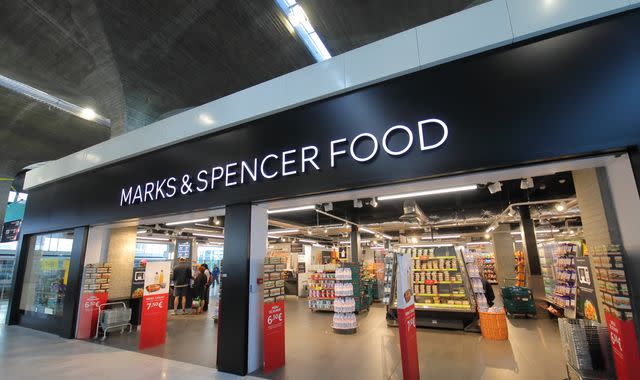M&S results give genuine hope that its fortunes have turned a corner

It's difficult not to be impressed by today's annual results from Marks & Spencer (M&S).
The numbers were not only appreciably ahead of City expectations but were also the best the retailer has delivered for a decade.
M&S reported a pre-tax profit, before adjustments related to its pension scheme, of £716.4m for the year to the end of March. That was up 58% on the previous 12 months.
The share price, up by almost 80% during the last year, rose by nearly 8% at one point before giving back earlier gains.
Money latest: June interest rate cut blow after inflation data
Stuart Machin, the chief executive, said it was a good year of progress against the retailer's strategic priorities and pointed out that there had been growth in sales, market share, margins, return on capital and free cash flow.
Addressing analysts and investors from the M&S store at Lakeside in Thurrock, Essex, Mr Machin said the financial health of M&S was "the best it has been in decades" - enabling the retailer to invest more and restore its dividend to pre-pandemic levels.
What will have particularly pleased management is that both main parts of the business are doing well.
Food, a strong point for M&S in recent years, grew operating profits by 59% to £395.3m.
Mr Machin said M&S food had won market share and attracted record customer numbers, across all demographics, led by families - reflecting heavy investment in everyday value and relying less on promotions. The reshaping of the store estate, begun by Mr Machin's predecessor Steve Rowe, has been a key factor here. But M&S also added 1,300 new lines as well as new ranges focusing on areas such as gut health and high-protein food.
Meanwhile, clothing and home, which has had a tendency to misfire in the not-too-distant past, grew operating profits by 24% to £402.8m.
Mr Machin enthused: "It was a robust performance in core product categories such as denim, knitwear, lingerie as well as men's Autograph and the Holiday Shop."
M&S has always had some traditional strengths, such as its market leadership in lingerie, yet even here there has been progress. M&S highlighted that sales of bras grew by 5% during the year, taking its market share to an all-time high of 38.2%, while knicker sales rose by 3%.
Some 60 million pairs of knickers, equal to 114 pairs every minute, were sold during the year. M&S has also obviously retained its status as being the place where most British women buy their first bra: some 30% of women buying underwear at M&S now under the age of 30.
However, M&S has also recaptured its credentials in clothing for both fashion and value, with Mr Machin suggesting the company's clothing ranges are both better and more stylish.
It certainly appears to be getting the basics right. M&S shifted 257,000 pure cotton v-neck women's knitted jumpers and 800,000 men's stretch chinos at £25 each - but is also winning favour from the fashionistas.
As important, from the financial perspective, has been weening customers off promotions. One of the more interesting revelations from today's presentation was that 81% of clothing sales are now at full price - up from 63% in the previous year.
The mix of products being sold is also evolving in home, where bedding, bath and kitchenware are increasingly the focus, not bulky furniture products.
That is not to say there were not blemishes in the results.
M&S's share of losses at Ocado Retail, which is jointly owned with Ocado and whose numbers are not consolidated in the results, rose by 26% to £37m.
Mr Machin noted: "Ocado is in the early stages of driving sales growth, which improved during the year…but there is so much more to do."
International was also a disappointment, with sales falling, mainly due to high levels of stock inventory.
Looking ahead, there will be more cost reductions, with Mr Machin warning that inflation was not out of the picture yet.
But led by the hard-driving Mr Machin and chairman Archie Norman, who has been the guiding light of this turnaround, M&S is sounding more confident than it has for years.
While they will take the garlands, credit is also due to Mr Rowe, who along with Mr Norman seized an opportunity during the pandemic to radically alter the size, shape and format of M&S stores and double down on the successful Simply Food proposition.
There have also been some helpful tailwinds. A number of M&S's competitors have gone to the wall during recent years, such as Debenhams, while John Lewis has had difficulties unique to it.
However, as every football fan knows, you can only beat what's put in front of you and, along with Next, M&S is now firmly a retailing ascendant.
With the benefit of hindsight, it was possible to see M&S's fortunes improving as long ago as late 2022, even as UK inflation was at a 40-year high.
Some long-term followers of M&S will observe, wearily, that we have been before.
M&S has enjoyed sporadic upsurges in fortune over the last couple of decades but quite often they have turned out to false dawns.
This time, it genuinely feels as if M&S has turned a corner.
No greater example of that came in the confident observation from management in the statement that "M&S ended the year in the strongest financial health since 1997."
The selection of that year is no coincidence. During the financial year 1997-98, under legendary former chairman Rick Greenbury, M&S achieved an annual profit of £1.17bn.
It feels churlish, today of all days, to point out that it has never hit those heights since.

 Yahoo News
Yahoo News 
